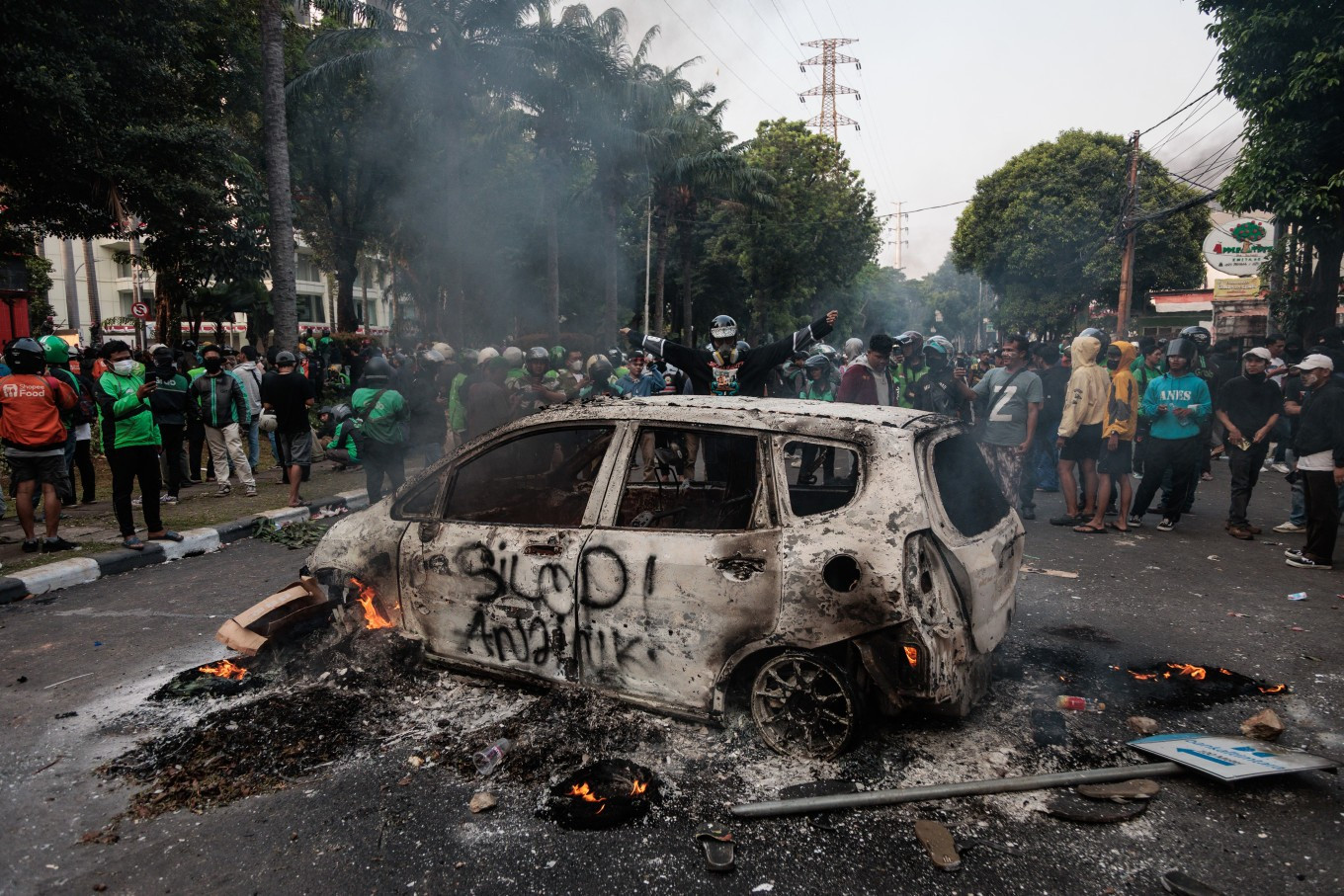News
Indonesia’s civil uprising: From arrogant politicians to state violence
Tenggara Strategics September 3, 2025 A crowd of protesters surround the burnt frame of a car outside the Central Jakarta headquarters of the Jakarta Metropolitan Police’s Mobile Brigade (Brimob) on Aug. 29, 2025, the day after a Brimob tactical vehicle ran over and killed on-demand motorcycle driver Affan Kurniawan, 21, as he was trying to flee the area of a labor protest that had turned violent (AFP/Aditya Aji )
A crowd of protesters surround the burnt frame of a car outside the Central Jakarta headquarters of the Jakarta Metropolitan Police’s Mobile Brigade (Brimob) on Aug. 29, 2025, the day after a Brimob tactical vehicle ran over and killed on-demand motorcycle driver Affan Kurniawan, 21, as he was trying to flee the area of a labor protest that had turned violent (AFP/Aditya Aji )
Indonesia has seen a turbulent week of public unrest centered on the House of Representatives (DPR), as outrage over lawmakers’ high pay and allowances spiraled into a broader movement demanding accountability, justice, and reform.
The wave began with the massive protest on Aug. 26 outside the DPR building in Jakarta, where thousands took aim not at specific legislation but at lawmakers themselves. Demonstrators denounced reports that House members were taking home more than Rp 100 million ($6,000) a month, excluding a controversial Rp 50 million housing allowance. Some have even put it at Rp 230 million a month. Former minister and legislator Mahfud MD even put it at more than Rp 1 billion a month.
Their anger was compounded by viral videos of lawmakers singing and dancing after President Prabowo Subianto’s Aug. 15 state of the nation address, in which he had called for national austerity. The images of indulgent lawmakers, paired with misinformation about salary hikes, crystallized widespread resentment at a time when most Indonesians are living through uncertain economic realities.
Many Indonesians are still earning below the official minimum wage, which ranges between Rp 2.1 million and Rp 5.4 million a month, depending on the region.
The dissolution of the House was one of the demands of protesters. Although this is not likely to happen, it reflects the low confidence the public has in its elected representatives.
Clashes broke out as police tried to control the Aug. 26 protest, but tensions deepened further when demonstrations resumed on Aug. 28. That day, Affan Kurniawan, a ride-hailing motorcycle driver, was struck and killed by a police armored vehicle during efforts to disperse crowds in Senayan, Central Jakarta.
His death, widely shared on social media, turned the protests from a debate about DPR salaries and political arrogance into a broader movement against state violence. Protesters’ chants shifted from merely abolishing allowances to demands for justice for Affan and accountability from both the police and lawmakers.
The morning after Affan was killed, the ambulance carrying his body to the cemetery was accompanied by thousands of other ride-hailing motorcycle drivers in an act of solidarity. From that point on, Indonesians began rallying in greater numbers across cities nationwide.
The list of demands grew: protesters called for the release of all protestors detained by law enforcement, the suspension of lawmakers deemed insensitive or corrupt, stronger checks on police violence, and a large-scale reform of the Police institution.
From Friday onward, reports of unrest escalated sharply, with bus stations, police posts, and regional parliamentary buildings being set ablaze in several major cities including Jakarta, Bandung, Makassar, Jogja and others.
As protests intensified over the weekend, the home of Nasdem party legislator Ahmad Sahroni, who made a statement earlier in the week calling critics of the DPR ‘stupid’, was approached by demonstrators and subsequently looted. Similar incidents were reported at other high-profile residences, including those of fellow Nasdem legislator Nafa Urbach, National Mandate Party (PAN) legislators Eko Patrio and Uya Kuya, as well as Finance Minister Sri Mulyani.
At the same time, several legislators were spotted abroad, accused of fleeing the country in fear of both public outrage and accountability. While the looting incidents appeared to mark an escalation, many activists and commentators suggested that these acts bore the hallmarks of a false-flag operation designed to delegitimize the protest movement and provide justification for a harsher crackdown.
The suspicion of orchestration has only fueled unease, with critics warning that it could be used to justify extraordinary measures, including the imposition of martial law.
Political fallout was unavoidable. By the end of the week, Nasdem suspended two of its members, Sahroni and Nafa Urbach, while PAN sidelined Eko Patrio and Uya Kuya. Golkar followed suit by suspending Deputy House Speaker Adies Kadir after his comments on allowances were deemed out of touch. These figures had become the spark for public anger, singled out for their arrogant behavior and tone-deaf statements that epitomized the wider disconnect between the DPR and the people.
On Aug. 31, President Prabowo delivered a televised speech acknowledging the unrest. He announced that the Rp 50 million housing allowance would be abolished immediately, a rare concession to popular protest. Yet while the move addressed one of the immediate grievances, the demonstrations underscored a deeper crisis of trust between the Indonesian people and their public institutions.
For many, the week’s events revealed not just dissatisfaction with legislative perks, but a demand for more accountable governance and protection from state-induced violence. The people have spoken and will continue to voice their demands. Now, it is up to President Prabowo to do the right thing.

